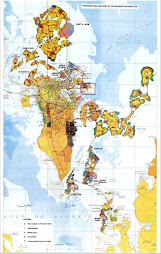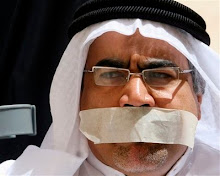SPECIAL REPORT:
Death on Martyrs Day
by James Lee,
special to [X]press
January 17, 2008 12:07 PM
SANABIS, Bahrain (SFSU) – Ali Jassim Al-Barbari, a 31-year-old bus driver and human rights activist, witnesses the Martyrs Day demonstration turn deadly. On December 17, 2007, members of the Special Security Force (SSF) and Bahraini Police in riot gear prepare to control the peaceful crowd. Ali hears the launch of a CS smoke projectile. The 38-millimeter canister rockets over the crowded street and lands among frightened demonstrators.Within seconds, additional CS smoke projectiles are fired. Loud voices and screaming can be heard along the outer perimeter of the demonstration. Bahraini Police begin firing 38-millimeter baton shells directly at demonstrators. Spent baton cartridges are dropped onto the ground by the advancing police.
A prophetic warning printed on the discarded metal cartridges reads, “Ricochet baton shells approximately 3 meters in front of person. Do not fire directly at persons, serious injury or death may result.”SSF and Bahraini Police pursue Ali and other demonstrators into nearby neighborhoods.
Thick clouds of CS smoke can be seen rising above the narrow streets. Scores of people are detained and beaten to the ground by the authorities. Evidence suggests that Ali is shot by baton rounds, exposed to CS gas and possibly beaten by police. Fighting for each breath, Ali manages to run from the Sanabis Village to his home in the Jid Hafss area. He collapses near the front door. “They destroyed us,” Ali whispers to his brother. “I feel like I am dying.” White foam drains from the corners of Ali’s mouth.Ali is carried into a car and driven to a nearby private hospital.
The Bahrain International Hospital refuses to admit Ali and directs him to another hospital. He dies en route to the Al-Sulaimania Governmental Hospital. “Inside the hospital, I could see round bruises on my brother's arms, legs and chest,” says Hassam Jassim Mohammed, Ali’s younger brother. “The police killed my brother.”The death of Ali has signaled the beginning of a large-scale coordinated attack by the Bahraini Government against the Human Rights movement.
Since Martyrs Day the government has arrested more than forty-five activists. Charges against the detainees include illegal gathering, rioting, damaging a police vehicle, theft of a weapon, theft of ammunition, possession of a weapon without permits, possession of ammunition without a permit, and attempted murder.Four days after Martyrs Day, a convoy of more than thirty vehicles speeds into the village of Sanabes.
Members of the SSF and Bahraini Police rapidly surround the house owned by the father-in-law of Mohammed Abdullah Al-Sengais. Mohammed heads the Committee to Combat High Prices. Without warning, the authorities force open the door to the residence and violently arrest Mohammed in front of his terrified family. Two weeks later, his wife is granted a ten-minute visitation inside the jail. The following day, at the Islamic Action Society, Mohammed's wife discusses her husband and the urgent need for international support for all the arbitrarily detained activists.“He smelled very bad. I could see deep cuts on both of his wrists. His eyes looked abnormal and had difficulty focusing. My husband informed me that his eyes have been covered since the date of his arrest.“I hope that the United States stands with us in this case. We fear for the lives of all the detainees. The Bahraini Government is criminal. I hope that the world can hear our voices.”
That same day, I speak with Hassan Mushima, General Secretary of the HAQ Movement. The aim of the organization is to secure a legitimate democracy and civil liberties for all people in Bahrain. Hassan discusses the political motivation behind the recent detention of activists and the historical significance of Martyrs Day.
“The detention of the activists is an attempt by the Al-Kalifa government to shift the attention of the people from the killing of Ali Jassim to the burning of a police vehicle and the alleged theft of weapons. “On Martyrs Day we remember those people killed by the government. Some were shot in the villages. Others were tortured in the prisons. We must not forget their deaths. Their deaths are not without purpose.”
U.S. President George W. Bush did not discuss Martyrs Day during a recent visit to Bahrain. His visit is part of a Middle East tour aimed at securing regional support on several key topics, including Iran. A confrontation last week between three U.S. vessels and Iranian boats in the Strait of Hormuz demonstrates rising tension between the two polarized countries.
In Bahrain, King Hamad Bin Isa Al-Khalifa and President Bush are entertained by dancers armed with swords and rifles during a ceremony inside a palace near the capital of Manama. “Our two nations share a common vision for the future of the Middle East,” Bush says. Outside the palace walls, approximately 300 Bahrainis gather near the U.S. Embassy to voice their opposition to current U.S. policies in the region.The unpopular policies of the U.S. are not the only problems facing the demonstrators. Sectarian discrimination by the Sunni led nepotistic Government of Bahrain, against the marginalized Shi’a majority, is a destabilizing social factor.
This dynamic contributes to widespread social problems within the small country. Manifestations are seen in mounting unemployment, widespread poverty, cost of living increases, and egregious human rights violations.In February of this year, the United Nations, under new mandates for member states, will inspect Bahrain. It is unclear if representatives from the U.N. will meet with unsanctioned organizations such as the Bahrain Youth Society for Human Rights (BYSHR).
Mohammed Al-Maskati, the President of BYSHR, is due in court on January 21, 2008. He has been charged with operating an unregistered society. “The wants of the people are not unreasonable,” says Mohammed during a recent interview. “We want the Bahrani Government to follow the law and to serve the interests of the people.” If convicted, Mohammed could serve up to six-months in prison.
James Lee is on assignment in the Middle East for the Golden Gate [X]Press Online, a publication of the Journalism Department at San Francisco State University.http://xpress.sfsu.edu/archives/news/009946.html
skip to main |
skip to sidebar

خارطة البحرين الجديدة
Facebook Badge
Followers
فسيلة السنكيس
متى ما ظهرت الفسيلة - الصغير من النخل- من فوق سطح الأرض، فمن حقها أن تنمو وان تعانق السماء دون حصار أو مضايقة أو استهداف
حق الفسيلة في الحياة كحق غيرها، من المخلوقات، خاصة وإن كانت دليل أصالة شعب كشعب البحرين
--------------------------------------------------------------
صاحب المدونة: د.عبدالجليل السنكيس
ناشط، كاتب وباحث أكاديمي من البحرين
البريد الإلكتروني: asingace@gmail.com
مدونة اخرى: http://alsingace.katib.org/
هاتف:8179-3966-973+
حق الفسيلة في الحياة كحق غيرها، من المخلوقات، خاصة وإن كانت دليل أصالة شعب كشعب البحرين
--------------------------------------------------------------
صاحب المدونة: د.عبدالجليل السنكيس
ناشط، كاتب وباحث أكاديمي من البحرين
البريد الإلكتروني: asingace@gmail.com
مدونة اخرى: http://alsingace.katib.org/
هاتف:8179-3966-973+
مواقع ووصلات ذات صلة Links of Interest
صور معبرة

خارطة البحرين الجديدة






